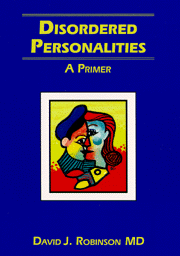

| Book review from the Canadian Family Physician Vol. 43, September, 1997 |
OVERALL RATING: Excellent.
STRENGTHS: Helpful summaries, many useful ways to identify and apply difficult concepts.
WEAKNESS: Readers might find the approach to a difficult subject too lighthearted.
AUDIENCE: Family physicians, therapists, social workers, and ministers who are active in providing therapy to people with personality disorders and who need to gain perspective on them.
Dr. Robinson set out to "provide a comprehensive primer on personality disorders that is both readable and fun to read." He has achieved this objective. The book is well organized; it has numerous categories – some might say too many – that provide a fund of information to those working with people with personality disorders. The value of the book lies in its courageous approach to identifying important characteristics of personality disorders and in its techniques to help readers remember these characteristics.
The book begins with an introduction to diagnostic principles and contains descriptions on testing and diagnosing personality disorders. A section on theoretical principles follows, with descriptions of ego psychology, basic psychodynamic principles, and distinctive features of cognitive and group therapies. The author discusses such disorders as schizoid, borderline, and obsessive personalities. He caricatures these personalities by describing the ways in which they might appear at a therapist’s office. Robinson also includes a synopsis of historical information on the development of personality disorders and other useful ways to identify disorders with which therapists might be dealing.
I found some of the interview considerations invaluable: ego defenses involved in each personality disorder, diagnostic criteria, transference and countertransference reactions, and a summary of therapeutic techniques.
The book is likely to encounter criticism in purely academic circles, partly because some difficult issues are passed over, but more likely because, at first glance, the approach to a difficult subject is excessively light-hearted. However, speaking as one who has wrestled with the difficulties of providing therapy to people with personality disorders and has experienced frustration and frequently a sense of failure while supporting such patients, I found this book a refreshing and useful resource.
I certainly will find a place on my bookshelf where it will be within easy reach. I can see myself referring to it regularly during struggles with difficult areas of psychotherapy and family medicine. Robinson has given us a valuable clinical tool, and for those who are interested in academic aspects of this area of medicine, this book is a starting point for exploring these issues.
Peter Newbery, MD, CCFP
Dr Newbery, a Fellow of the College, is a rural physician and an Associate Clinical Professor in the Department of Family Practice at the University of British Columbia, and is Director of United Church Health Services for Canada.
| Book review from Doody Publishing, Inc. |
Disordered Personalities: A Primer
Author: Robinson, David J., MD, FRCPC (Univ. of Western Ontario)
Bibliographic Data:
Book Data: 12 chapters, 288 pages, Hard Cover
Specialty 1: Psychiatry Specialty2: Psychology, Clinical
Doody’s Notes:
Primary Audience: Psychiatry Residents. Secondary Audience: Psychology Graduate Students.
The book contains black-and-white illustrations.
Reviewer’s Expert Opinion:
Reviewer: Michael J. Schrift, DO (Rush-Presbyterian-St. Luke’s Medical Center)
Description: This is a unique new book on the basics of personality disorders that is presented in a humorous style. This primer is funny and well written and would be a useful teaching tool for trainees.
Purpose: The purpose is to provide a comprehensive primer on personality disorders that is both readable and fun to read. The author has accomplished this mission.
Audience: The intended audience is medical students and psychiatry residents. Clinicians and trainees in psychology, social services, family practice, and internal medicine would also enjoy and benefit from this primer. Any clinician who cares for patients will find this an extremely useful book.
Features: The book features 288 pages containing sections on each personality disorder. Each section has a reference portion that is really a "suggested reading," since these citations are all secondary and tertiary sources. The book is filled with amusing illustrations, caricatures, and even media examples of the various personality traits, which is a good way for trainees to remember these disorders.
Assessment: This is an excellent, humorous, and useful teaching tool intended for trainees. This is definitely a fun way to learn this material.
Anne Hennessy
Managing Editor
Doody Publishing, Inc.
1145 Westgate
Oak Park, IL 60301
(708) 386 9500 (ph)
(708) 386 0860 (fax)
anneh@doody.com